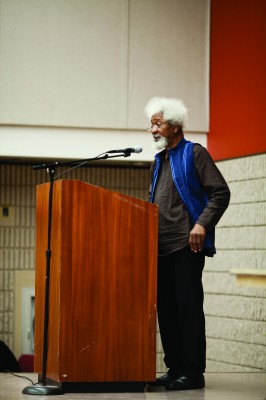Wole Soyinka speaks on the role of Africa in the New World Order

As part of International Week, Nobel Prize Winner Wole Soyinka spoke to students about the late author Chinue Achebe as well as Africa’s role in a changing world. (Maurice C. Jones/Broadside)
In Dewberry Hall, students sit around tables, watching rapt as a group of dancers sway to the beat of drums. The women swing their skirts in an arc, evocative of scythes slashing through crops.
This is Yoruba dancing, a traditional West African dance performed by Professor Jim Lepore’s Afro-Cuban dance class to precede a Q&A session by Nobel Prize-winning writer Akinwande Oluwole “Wole” Soyinka.
Soyinka visited Mason on April 12 as a part of the university’s annual International Week program, giving a pair of talks. The first, entitled “From Cleopatra to Mandela: The Role of Africa in the New World Order,” was a panel discussion on Soyinka’s career as well as the state of contemporary Africa.
Soyinka talked about a wide variety of topics, from the legacy of late author Chinue Achebe to the place of Africa in the 21st century world and his hopes and fears for the future of Nigeria.
Later in the evening, he read from his own work in an event called “Poems of Self- Retrieval, Cultural Security and Recollection”.
Born on July 13, 1934 in Abeokuta, Nigeria, Soyinka is a poet, dramatist, novelist, essay- ist and professor-in-residence at Loyola Marymount University.
He played an active role in Nigeria’s fight for independence and the ensuing civil war.
In 1967, he was accused of conspiring with Biafra rebels and was held in custody for almost two years—an incident that inspired his career as a writer, intellectual and political activist. Soyinka won the Nobel Prize for Literature in 1986, becoming the first-ever African to receive the honor.
“One of the great things about Soyinka is that he is not a writer who is there in his ivory tower… No, he is a writer that [has been] present since the beginning of his career,” said Rei Berroa, a professor of Spanish and Latin American culture at Mason.
Berroa invited Soyinka to come to Mason as a guest speaker after recommending him for the Trieste Poesia International Award in 2012.
International Week at Mason originated in 1981 and is co-sponsored by the Office of International Programs and Services and the Office of Student Involvement, though the individual events are sponsored by different groups across the university.
The Wole Soyinka event, for example, was sponsored by the department of modern and classical languages.
In addition to guest speakers like Soyinka, the committee consisting of students and staff advisers responsible for I-Week hosted an opening ceremony parade, dance competitions, film screenings, food tastings, cultural nights and academic forums, among numerous other events.
Judith Green, University Life’s executive director of international programs and services (OIPS), emphasizes the richness and diversity of Mason’s International Week program.
“Everyone gets a seat at the I-Week Table,” Green said. “Any campus group can sponsor something related to global, international cross-cultural learning or experience and it can be included.”
One of the great things about Soyinka is that he is not a writer who is there in his ivory tower… No, he is a writer that [has been] present since the beginning of his career
Rei Berroa, a professor of Spanish and Latin American culture
OIPS helps the Mason community to connect with people from different cultures, nationalities and ethnicities and to learn about international issues.
Green expressed her gratitude for having the opportunity to include Soyinka in this year’s schedule.
“International Week is very important because it gives presence to something Mason takes pride in, which is its internationalism,” Berroa said. “I remember there were something like 120 nations represented at Mason. It means that probably there are more than 100 languages spoken every day on this campus. So, if we are that kind of university, we have to have some kind of celebration…This week, we celebrate what it is to be international and how we can make the world a better place for everybody if we can understand who we are by understanding who is the ‘other.’”
And in the process of learning about the world and trying to solve its problems, enlisting the knowledge and experience of a Nobel Prize winner seemed a good first step.
1986
The year that Akinwande Oluwole “Wole” Soyinka won a Nobel Prize in Literature.






Comments